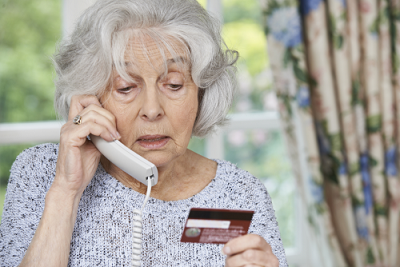Scams & Fraud
 Elder fraud is an act targeting older adults in which attempts are made to deceive with promises of goods, services, or financial benefits that do not exist, were never intended to be provided,
or were misrepresented.
Elder fraud is an act targeting older adults in which attempts are made to deceive with promises of goods, services, or financial benefits that do not exist, were never intended to be provided,
or were misrepresented.
People today are bombarded with telemarketing phone calls, junk mail, and people knocking on their doors trying to sell things to them. However, many of them don't realize that it is OK for them to hang up the phone, tear up the junk mail, or refuse to open their doors to people they don't know.
Every year, people lose millions of dollars to fraud, cons, and scams. Little, if any of this money is ever recovered. Criminals involved in these activities need your personal information - credit card numbers, bank account numbers, social security or driver's license numbers, or even Medicare or Medicaid numbers - if they are going to succeed.
Do not give out personal information to anyone on the telephone or at your door unless you solicited his or her service.
Seniors are often targets for unscrupulous business practices, particularly in: Construction and home repair; fair housing; hearing airs; cemeteries & pre-need burial contracts; opticians. The Virginia Department of Professional and Occupational Regulation (DPOR), which oversees the licensing of individuals in these areas, strives to keep consumers informed by producing informational materials. To download a copy of these materials, visit their web site.
To report a problem or obtain more information, contact DPOR's main phone number (804) 367-8500. A directory will guide callers to the appropriate location to make a complaint or obtain necessary forms.
Identity Theft
 Identity theft is a growing problem in today's technological society. Identity theft occurs when someone uses your personal information - such as your name, social security number, or credit card number - to commit fraud or theft. Most frequently the "thief" will make purchases using your bank or credit card account number, or open new charge accounts in your name.
Identity theft is a growing problem in today's technological society. Identity theft occurs when someone uses your personal information - such as your name, social security number, or credit card number - to commit fraud or theft. Most frequently the "thief" will make purchases using your bank or credit card account number, or open new charge accounts in your name.
If you are victimized by identity theft, repairing the damage done to your reputation and credit rating can be frustrating, time-consuming and costly. Learning how to protect yourself from this crime is your best defense.
Further Information
- Division of Consumer Protection at the Virginia Department of Agriculture and Consumer Services produces several helpful publications on identity theft. They are available on the OCA website on their "News and Information" web page under the heading "Consumer Press Releases"
- The Office of the Attorney General (OAG) also produces several publications to help inform individuals about identity theft. They are available on the OGA's web page
-
Other contacts for victims of identity theft:
-
State Corporation Commission (SCC)
Toll-Free: 1-800-552-7945
SCC's Bureau of Financial Institutions (804) 371-9657
SCC's Bureau of Insurance (804) 371-9741 -
Federal Trade Commission
Toll-Free: 1-877-438-4338
Phone: (202) 326-3128
-
State Corporation Commission (SCC)
Financial Exploitation
Financial or Material Abuse or Exploitation is defined as the illegal or improper use of another person's funds, property, or assets. Examples include but are not limited to: cashing another person's checks without their authorization or permission; forging another person's signature; misusing or stealing another person's money or possessions; coercing or deceiving another person into signing any document (such as a contract or will); and the improper use of a conservatorship, guardianship, or power of attorney.
A person may be suffering from financial abuse or exploitation if:
- There is unusual or inappropriate activity in their bank or other accounts;
- The signatures on checks or other documents do not resemble their signature, or they are unable to write;
- A power-of-attorney has been given to a person, or recent changes have been made to their will, and the individual is not capable of making those kinds of decisions;
- A caregiver expresses unusual concern that an excessive amount of money is being expended on their care;
- There are numerous unpaid bills or overdue rent when someone is supposed to be paying their bills;
- They are placed in a nursing home or other residential care facility that is does not "agree" with the alleged size of their estate;
- They lack amenities, such as TV, personal grooming items or appropriate clothing that their estate could well afford;
- They are missing personal belongings such as art, silverware, jewelry or collections of value; or
- They are deliberately isolated from friends and family, resulting in the caregiver alone having total control.
Abuse & Neglect
Elder abuse is a term referring to any knowing, intentional, or negligent act by a caregiver or any other person that causes harm or a serious risk of harm to a vulnerable adult.
A person may be suffering from abuse if:
- They are not given the opportunity to speak for themselves, or to see others, without their caregiver being present
- Their caregiver has an attitude of indifference or anger towards them
- There is an obvious absence of assistance by their caregiver
- Their caregiver blames the person for uncontrollable behaviors (e.g., the caregiver states that their incontinence is a deliberate act)
- Their caregiver displays aggressive behavior (threats, insults, harassment) toward them
- Their caregiver has a history of abuse of others
- Their activities are restricted, or they are isolated from family and friends by their caregiver
- Their caregiver is unwilling or reluctant to to comply with service providers or others in planning or implementing care for them
- Their caregiver displays inappropriate or unwarranted defensiveness when questioned about the care recipient or the care being given.
Neglect is the failure of a caretaker to provide goods or services necessary for the care recipient to avoid physical harm, mental anguish or mental illness. Examples of neglect are abandonment of the care recipient, denying a care recipient food or liquids, or denying them health-related services.
A person may be suffering from neglect if:
- Dirt, the smell of feces and or urine, or other health and safety hazards are present in their living environment
- They have rashes, sores, or lice on their body
- They are inadequately clothed
- They are malnourished or dehydrated
- They have a medical condition that has not been treated
Abandonment is defined as the desertion of an person by an individual who has assumed responsibility for providing care for that person, or by a person who has physical custody of that person.
A person may have been abandoned if:
- They have been deserted at a hospital, a nursing facility, or a similar institution
- They have been deserted at a shopping center or other public place
- They report that they have been abandoned
What To Do If You Suspect Abuse or Neglect
If there is immediate danger to a person, find a telephone and dial 911. An emergency exists and you need the assistance of police and/or rescue personnel.
If no immediate danger exists, you still need to report the abuse or neglect. Contact the Virginia Department of Social Services' Adult Protective Services (APS) 24-Hour Hotline toll-free at ![]() 1-888-832-3858.
1-888-832-3858.
For more information on Adult Protective Services, or on reporting abuse to APS, please visit DSS's APS webpage.
You can also call your local Department of Social Services and ask for "Adult Protective Services" department. You can find their telephone number in the "blue pages" section of your local telephone directory.








